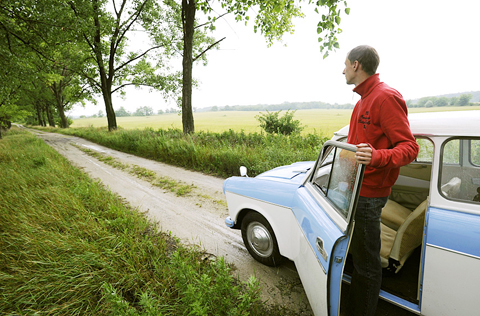European leaders gathered yesterday in Budapest to mark the 20th anniversary of the symbolic fall of the Iron Curtain, often described as the first crack in the Berlin Wall and one of the key episodes leading to the end of communism in Eastern Europe.
The presidents of Germany, Austria, Finland, Slovenia and Switzerland, as well as high-ranking officials from Poland, Britain and more than 20 other countries were to participate in a commemorative session at the Hungarian parliament and a gala event at the Hungarian State Opera House.
On June 27, 1989, the then-foreign ministers of Hungary, Gyula Horn, and Austria, Alois Mock, cut through some barbed wire on the border between the two countries, putting a symbolic end to a physical and psychological boundary of which by then there was little left.

PHOTO: AP
Hungary had begun to dismantle the Iron Curtain nearly two months earlier — partly because border guards said it was in such poor condition that even small animals were setting off false alarms along the electrified fence.
With most of it already gone, officials had trouble finding even a small section of the Iron Curtain for Horn and Mock’s staged photo opportunity with wire cutters.
“What happened at the end of June was a nice symbolic gesture ... but the border continued to be strictly controlled,” Swiss-Hungarian journalist and historian Andreas Oplatka said on state radio.
Pictures of the event were published around the world and inspired thousands of East Germans to leave their country, find temporary refuge in Hungary, Poland or Czechoslovakia and wait for an opportunity to travel to West Germany.
By the end of the summer, thousands of East German “tourists” were living in tents on the grounds of the West German embassy in Budapest and in several other locations around the city, including church yards and the site of a communist youth camp.
After allowing some of the “Ossies” to leave for West Germany via Austria in August and then some more a few weeks later, Hungary finally decided to let all East Germans out from Sept. 11, 1989.
Within two months, on Nov. 9, the Berlin Wall fell and Germany’s reunification was formalized in October 1990.
“The peaceful turn of events of the year 1989 was the great triumph of the citizens of the former Eastern Bloc states,” Austrian Foreign Minister Michael Spindelegger said on Friday during a memorial event near the border with Hungary. “Today, watchtowers and barbed wire are a part of the past. The ‘peace project Europe’ has prevailed with much success.”

Kehinde Sanni spends his days smoothing out dents and repainting scratched bumpers in a modest autobody shop in Lagos. He has never left Nigeria, yet he speaks glowingly of Burkina Faso military leader Ibrahim Traore. “Nigeria needs someone like Ibrahim Traore of Burkina Faso. He is doing well for his country,” Sanni said. His admiration is shaped by a steady stream of viral videos, memes and social media posts — many misleading or outright false — portraying Traore as a fearless reformer who defied Western powers and reclaimed his country’s dignity. The Burkinabe strongman swept into power following a coup in September 2022

‘FRAGMENTING’: British politics have for a long time been dominated by the Labor Party and the Tories, but polls suggest that Reform now poses a significant challenge Hard-right upstarts Reform UK snatched a parliamentary seat from British Prime Minister Keir Starmer’s Labor Party yesterday in local elections that dealt a blow to the UK’s two establishment parties. Reform, led by anti-immigrant firebrand Nigel Farage, won the by-election in Runcorn and Helsby in northwest England by just six votes, as it picked up gains in other localities, including one mayoralty. The group’s strong showing continues momentum it built up at last year’s general election and appears to confirm a trend that the UK is entering an era of multi-party politics. “For the movement, for the party it’s a very, very big

ENTERTAINMENT: Rio officials have a history of organizing massive concerts on Copacabana Beach, with Madonna’s show drawing about 1.6 million fans last year Lady Gaga on Saturday night gave a free concert in front of 2 million fans who poured onto Copacabana Beach in Rio de Janeiro for the biggest show of her career. “Tonight, we’re making history... Thank you for making history with me,” Lady Gaga told a screaming crowd. The Mother Monster, as she is known, started the show at about 10:10pm local time with her 2011 song Bloody Mary. Cries of joy rose from the tightly packed fans who sang and danced shoulder-to-shoulder on the vast stretch of sand. Concert organizers said 2.1 million people attended the show. Lady Gaga

SUPPORT: The Australian prime minister promised to back Kyiv against Russia’s invasion, saying: ‘That’s my government’s position. It was yesterday. It still is’ Left-leaning Australian Prime Minister Anthony Albanese yesterday basked in his landslide election win, promising a “disciplined, orderly” government to confront cost-of-living pain and tariff turmoil. People clapped as the 62-year-old and his fiancee, Jodie Haydon, who visited his old inner Sydney haunt, Cafe Italia, surrounded by a crowd of jostling photographers and journalists. Albanese’s Labor Party is on course to win at least 83 seats in the 150-member parliament, partial results showed. Opposition leader Peter Dutton’s conservative Liberal-National coalition had just 38 seats, and other parties 12. Another 17 seats were still in doubt. “We will be a disciplined, orderly